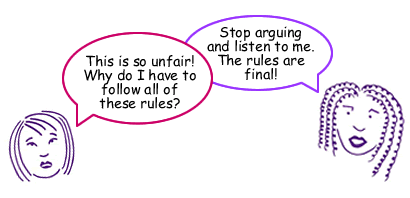For Teens: How to Handle Arguments with Family and Friends

Sometimes arguments or disagreements with family and friends can be difficult to handle. Learn how to keep an argument from getting out of hand.
Real Life: Family
"My sister is so annoying! She is driving me crazy!"

Jenny and her sister Sarah fight all the time. Jenny is angry with Sarah because she barges into her room and takes her things without asking. Sarah complains that Jenny yells too much and spends all of her time on the phone.
Your brothers and sisters can upset you sometimes. You may get angry if they take something that is yours, go into your room, hit you, or bother you when you have friends over. Your older brothers or sisters may try to boss you around and tell you what to do. Your younger brothers or sisters may borrow your things or want to be around you all the time.
When you argue with your friends, you can go home and get away from them. But, when you argue with a brother or sister, they are in your house and you may feel like you can't get away from them. Talking things out and coming up with rules that you and your brothers and sisters agree on will make living together a lot easier.
Here are some ways to handle an argument and help you to avoid fighting with your brother(s) or sister(s):
- Go for a walk or go to separate rooms in the house, before you lose your temper in an argument.
- Talk to your parents about what is bothering you. Most likely they will be able to give you advice.
- Set up your own personal space. Even if you share a bedroom, make a little space (even in a corner of your bedroom) that is all yours. Tell your brother or sister that they need to knock before coming into your bedroom or your special area of a shared bedroom.
- Respect your brother or sister's personal space too - whether it is their room or a part of your shared bedroom. They will be more likely to show you the same respect in return.
- Decide ahead of time how you are going to share the phone. For example, you can figure out separate times when each of you can talk to your friends.
- Take turns with the television. Talk ahead of time about what shows you want to watch, then take turns watching your favorite shows if they are on at the same time.
- Pick your battles. Try to figure out what is really bothering you. This will help you to know if the problem is worth arguing about. Some issues may be more important than others.
Now that you have some ideas on how to avoid fighting, you may want to think about how to work on building a healthy relationship with your brother or sister. Talking about the things that are bothering you in a calm way really helps. Doing things together, like going on a bike-ride or watching a movie will give you a chance to talk to each other and enjoy the time that you spend together too.
Real Life: Friends
"Why should I do what YOU say?"

Abby and Maria have been friends for a long time. Abby has been upset because Maria always decides where they are going and what they are going to do. Maria also tells Abby who she can be friends with. Abby feels a lot of pressure to do what Maria tells her to do.
Friendships can be complicated at this time in your life. You may be making new friends while you are trying to keep old friends. One thing that can make any relationship complicated is peer pressure. Peer pressure is when you chose to do something you usually wouldn't do, or you stop doing something that you normally would do because you are worried about what your friends will think. Some friends may pressure you to do something because "everyone else does it," such as making fun of someone. One of the biggest challenges that you may have to face is standing up to a friend.
Here are tips to help you handle a disagreement with a friend:
- You always have the right to say "no" to your friend whenever you want to. In a healthy friendship, you should not be afraid of losing a friend because you say "no." Good friends should respect your right to say no about anything and not give you a hard time. It is important that you show your friend the same respect when they say no to you.
- If you and your friend disagree about something or have an argument, it does not mean that you have an unhealthy relationship. You will not always agree with what your friend has to say. As long as you and your friend can talk to one another and listen to what each person has to say, you should be able to work through a disagreement. Healthy friendships involve trust and being able to respect each other's differences.
- The friends that you make and the relationships you develop will help you learn a lot about yourself. Your friendships may be the most important thing to you right now. You will find out what things you like to do together but more importantly, you will learn about the kind of friends you want to have and the kind of friend you want to be to others.
Real Life: Dating
"A boy that I like kissed me at the dance... Are we dating now?"

Anna and Jamal like each other. They met a few weeks ago at a dance. They want to get to know each other but don't know what to do next.
There is no best age for teens to begin dating. Every person will be ready for a dating relationship at a different time. Different families may have certain rules about dating too. When you decide to start a new dating relationship, it should be because you care about someone and not because you feel like you have to have a boyfriend or girlfriend. A dating relationship is a special chance to get to know someone, share your thoughts and feelings with each other, and do activities together.
Healthy dating relationships should start with the same ingredients that healthy friendships have, such as good communication, honesty, and respect. Dating relationships are a little different because they may include physical affection, like hugging, kissing, or holding hands. As with all relationships, it may be tempting at first for you to spend all of your time with your new partner. But, making special time to spend together and apart means that you will be able to work on having a healthy relationship with the person you are dating and with other people in your life, like your friends and family.
You should NEVER feel pressured to do something that you don't want to do. He/She should always respect your right to say no to anything that makes you feel uncomfortable. It is important that you are both clear with each other about your values and your limits. By talking about how each of you feel about a lot of things, you may avoid getting into situations where you are pressured into making a decision on the spot about something very important.
Here are some tips for starting a healthy dating relationship and ways to stay safe:
- Get to know a person by talking on the phone or at school before you go out with them for the first time.
- Go out with a group of friends to a public place the first few times you are spending time together.
- Plan fun activities like going to the movies, a picnic, the mall, a walk, etc.
- Be clear with the other person about what you feel comfortable doing and what time your parent(s) or guardian(s) expect you to be home.
- Tell at least one friend and especially your parent(s) where you are going, who you will be with, and how to reach you.
Dating relationships can be a fun and exciting part of your life now. They may be a little confusing, especially if dating is new to you. Once you know that the person that you like, likes you too, you may be unsure of what to do next. You can start by learning about what makes a dating relationship healthy. The most important thing to remember is staying safe, especially when you begin to date.
Real Life: Parents
"I hate these stupid rules!"

Kim has been arguing with her parents a lot lately. She feels that all the rules that her parents set are unfair. They tell her that she needs to listen and obey them.
Your relationship with your parents may be confusing right now. As you are growing and changing, you have more responsibilities and also more freedom to spend time with other people like friends or dating partners. While you may feel ready to make your own decisions about where and when you go places, your parents will put limits on you. The reason that your parents do this is because they care about you and want to protect you from danger.
You may find that you are fighting with your parents more than you used to.
Here are some tips for how to avoid and handle arguments with your parents:
- Discuss the rules ahead of time and not at the last minute. This way you will be able to tell what they will say yes or no to before you make plans. your parents can also explain to you why each rule is in place. Ask them to give you the chance to explain how the rules make you feel and suggest what you think are appropriate rules. Your parents may be willing to listen to your ideas and use them when making rules that you both agree on.
- Try to remain calm and do not lose your temper when your parents say no to something. You will show your parents that you are responsible and mature by talking instead of yelling and listening to what they have to say.
- Follow each rule that they set. If your parents tell you to be home at a certain time, stick to it. They may begin to worry about your safety if you are late. By being responsible and by following rules, your parents may be willing to negotiate a later time in the future, especially if they know that you will follow their rules.
- Pick your battles. Try to figure out what is really bothering you. This will help you to know if it is worth arguing about. Some issues may be more important than others.
- Spend time with your family. Some teens argue with their parents over the amount of time they spend with their friends. Communicate with each other and make some special family time so that you can all enjoy the time you spend at home. Suggest activities that your whole family will enjoy together such as going for a hike, a bike ride, or going to the beach
Remember healthy relationships are about feeling good about who YOU are and feeling SAFE with another person. You have the power to create healthy relationships all around you just by paying attention to who you are inside and what makes you happy. By getting to know yourself, it will get easier to recognize the differences between healthy and unhealthy relationships. Communication, trust, and respect are the key ingredients for healthy relationships.
APA Reference
Staff, H.
(2021, December 15). For Teens: How to Handle Arguments with Family and Friends, HealthyPlace. Retrieved
on 2025, July 5 from https://www.healthyplace.com/relationships/teen-relationships/how-to-handle-arguments-with-family-and-friends



